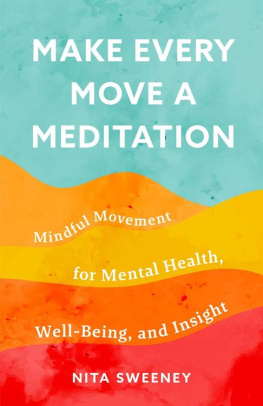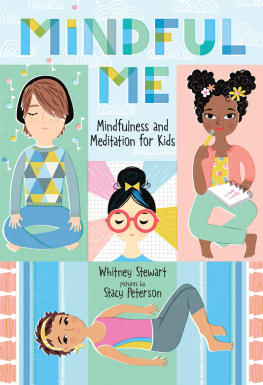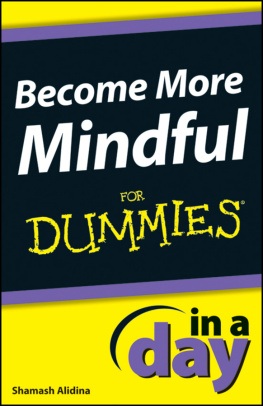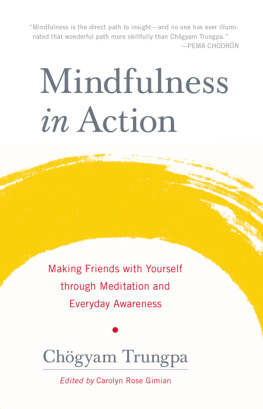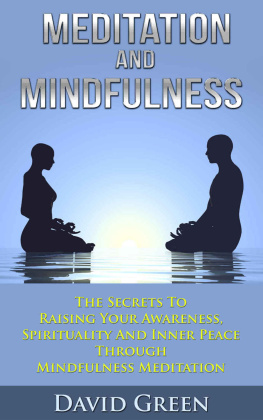THE MINDFUL
GEEK
Michael W. Taft

2015
Copyright 2015 by Michael W. Taft All rights reserved. This book or any portion thereof may not be reproduced or used in any manner whatsoever without the express written permission of the publisher except for the use of brief quotations in a book review.
Cephalopod Rex Publishing 89 Kensington Rd.
Kensington, CA, 94707 USA www.mindfulgeek.net
www.meditationwithmichael.com
www.deconstructingyourself.com
International Standard Book Number: 978-0692475386
Version number 001.00
Until you make the unconscious conscious,
it will direct your life and you will call it fate.
~ C. G. Jung
CONTENTS
Acknowledgments
Id like to thank my meditation teachers, Dhyanyogi Sri Madhusudandasji, Sri Anandi Ma Pathak, Dileepji Pathak, and Shinzen Young for all their love, patience, and guidance over the decades. Shinzen in particular has been instrumental in the ideas, formulations, and system presented in this book.
The Hindus have a saying that your first spiritual teacher is your mother, and that is certainly true in my case. Thanks, Mom. And thanks to my whole family.
Thanks to Thomas Metzinger, Judson Brewer, Dave Vago, and Richie Davidson for serving as friends and inspiration, and for their research and thought leadership which is moving the field forward.
Thanks to Sandra Aamodt, Bridgette Anderson, Al Billings, Gareth Branwyn, Bill Duane, Braxton Dudley, Jessica Graham, Sean Dae Houlihan, Todd Mertz, Julianna Raye, Zachary Schlosser, Corey Swartsel, Lindsay Strke, Ishan Walpola, and Erik Yates all contributed vital notes, feedback, and enthusiasm that helped to greatly improve this text. And thanks to Troy Coll, Carol Schneck Varner, and Emily Yates for proofreading above and beyond the call of duty.
Thank you to Bill Duane and Michael Van Riper for giving me the opportunity to field-test so many of these ideas and teaching methods with the bergeeks at Google.
Thanks to Rick Hanson for his unflagging and deeply enthusiastic support. Peter Baumann for making so many things possible, and for keeping things interesting. Corey Swartsel, Douglas McLeod, Ellen Balis, Maurizio and Zaya Benazzo, Amy Hertz, Amber Rickert, Jessica Graham, and Rick Jarow for being wonderful human beings.
Thank you to Morgan Blackledge and Laura V. Ward, who have been friends on this journey of awakening ever since the old days in East Lansing. Requiescat in pace, Robert Nash.
Thank you to Krisztina Lazar and Ernst Schmidt for helping to conceive and design the exterior. Thanks to Gareth Branwyn for editing the final manuscript, and for contributing so much experience and help to the crowdfunding campaign. Hail, Eris!
A deep thanks to all my students over the years who have taught me so much, and for being such fierce, brave, and loving people.
Very special thanks to Krisztina Lazar.
Finally, the creation of The Mindful Geek was made possible by the generous contributions of many individuals to its Indiegogo funding campaign. Id like to thank the following people, as well as many others who wished to remain anonymous. My apologies if I have inadvertently left anybody off of this list.
Adam Farasati, Adam Pfenninberger, Allison Ayer, Alvin Alexander, Ana Rubio, Andrea Lazar, Arrowyn Husom, Audrey M Korman, Bianca Petrie, Bobby L Bessey, Boris Schepker, Brent Cullimore, Brian Baker, Brian P Rumburg, Bridgette Anderson, Brooks M Dunn, Charlotte Kay, Christine Rener, Cory Smith, Cyril Gojer, Damian Frank, Daniel Abramovich, Daniel B Horton, Daniel L Ruderman, Daragh J Byrne, Darin Olien, David B Tierkel, Denise G Ellard, Dianne Powers Wright, Dominick Pesola, Donniel Thomas, Douglas McLeod, Elan J Frenkel, Elvira Gonzalez, Emily Barrett, Emily Yates, Eric Klein, Erin Diehm, F F Seeburger, Francesca de Wolfe de Wytt, Francis Lacoste Julien, Gareth Branwyn, George R Haas, Gil Evans, Giuseppe Falconio, Glenda K. Lippmann, Heidi E Clippard, Heidi Hardner, Hirofumi Hashimoto, Hulkko Heikki, Isabelle C Lecomte, Jacqueline Nichols, Jamie L Rowe, Jeanette Cournoyer, Jessica Clark-Graham, Joan T Sherwood, Joel Bentley, John B Rasor, Jonathan Schmitt, Joy C Daniels, Judy N Munsen, K A Berry, Karen Cowe, Karen Yankosky, Kaycee Flinn, Kenneth Britten, Kenneth Lalonde, Kestrel C Lancaster, Laura Saaf, Laura V Ward, Lauren Monroe, Laurie Morrow, Linda L. Small, Linda Read, Lindsay M Strke, Lisa J Brayton, Loren W Smith II, Louis Billings, Lydia Leovic Towery, Mark J. Miller, Mark K. Glorie, Marsha E Parkhill, Micah Daigle, Michael Baranowski, Michele P Berry, Michelle L Lyon, Yogi Nataraja Kallio, Nick R Woods, Noah J Hittner, Pamala Lewis, Paula A Zittere, Peter H Goh, Pokkrong Promsurin, Qadir Timerghazin, Randy Johnson, Rebecca L. Johnson, Richard Miller, Robert D Larson, Robert Y Smith Jr, Saiesh C Reddy, Samuel D Brown, Sanjeev Singh Guram, Sara A. Sporer, Scott R Petersen, Sharad Jaiswal, Shyamaa Creaven, Stefan Kahlert, Stephen Wharmby, Stina Stiernstrom, Sue Kretschmann, Susan Whitman, Suzanne Rice, Timothy Boudreau, Todd Sattersten, Troy Coll, Tyler Osborn, Volkmar Kirchner, William D Culman, William Duane, William H Taft Jr, Willow Pearson, and Zachary Schlosser

Introduction
From Zen temples in Japan to yogi caves in India, Ive been meditating for over thirty years. As a result, I have extensive experience in both Buddhist and Hindu meditation traditions. I started in the late 70s, because I was experiencing so much teenage anxiety. Meditation gave me some relief, and I was hooked. In the 1990s, I worked as editorial director for Sounds True, a publishing company specializing in spiritual and psychological teaching programs. While there, I had the good fortune to meet dozens of the most popular and interesting spiritual teachers in the world. I produced their programs, which meant that I got exposed to the workings of dozens of traditions.
At Sounds True, I met an American meditation teacher named Shinzen Young and helped to create his classic program The Science of Enlightenment. I found his style of teaching, which was both science-oriented and ecumenical, attractive for a number of reasons which deeply resonated with me. While nominally a Buddhist, he could talk intelligently about the spiritual practices of many religions and traditions. He was also a geekfascinated by dead languages and abstract mathematics. I liked his modern, rational, and non-sectarian viewpoint.
I have studied and worked with Shinzen for several decades now, and I am currently a senior facilitator in the Basic Mindfulness system he created. Basic Mindfulness is by far the most comprehensive and industrial-strength meditation system Ive encountered. Much of what youll find in this book is Basic Mindfulness, and you have Shinzen to thank for the real clarity and brilliance behind these techniques. I have altered the system in several respects, however, in order to make it more accessible and friendly to those whom we might call mindful geeks, and also to fit my own teaching style, methods, and predilections.
About ten years ago, a friend asked me if I would consider teaching him, and a group of people he knew, how to meditate. Having had to work through so many of my own difficulties the hard way, I was happy to give others the best of tools and the skills I had learned to help improve their lives. Our society doesnt prepare people to deal with most of the challenges we actually end up facing. Stress, overwhelm, constant worry, the breakup of meaningful relationships, death of loved onesthese are just a few of the aspects of life that our schooling never addresses. I can only imagine how much a meditation class in high school, even as an after school activity, would have helped me with my significant childhood anxiety. We receive no formal training in emotional regulation, ability to focus, healthy forms of relaxation, nor in a dozen or so skills that would be invaluable to ourselves and society. Having gone out and acquired these skills on my own, I could see how others around me could benefit from them too.


